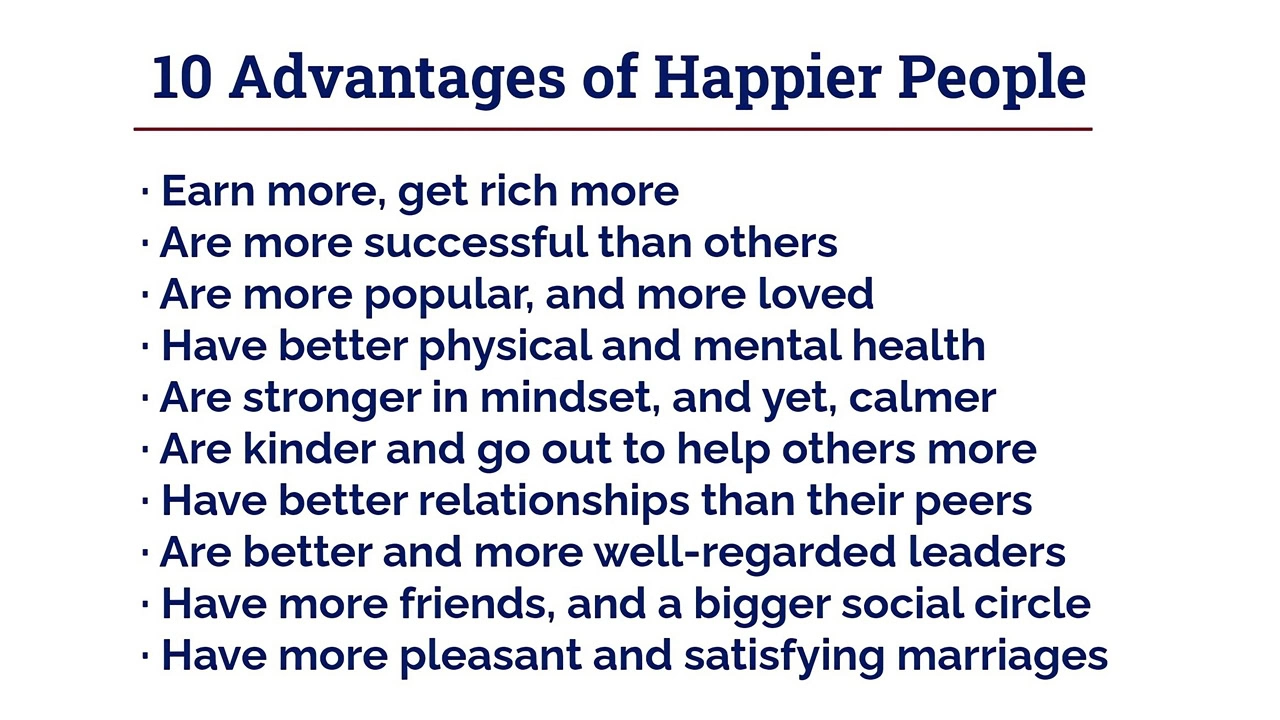Today's Thursday • 11 mins read
— By Dr. Sandip Roy.
Being happier is actually good for our minds and bodies. Positive psychologists, or happiness scientists, confirm it.
Three quick reminders before we dig in:
- You don’t need to wait to be happy until everyone else is happy.
- You don’t have to feel guilty about doing things for your happiness.
- When you make a list of your loved ones, make sure you’re on that list.
It’s okay to choose happiness for yourself as long as you don’t hurt others.
So, let’s find out what science tells us about the A’s and B’s of happiness.
There’s a quiz to check your happiness later in this post; go here to take the WRI Inventory test.
A’s and B’s (Advantages and Benefits) of Happiness
Happier people outdo others in many ways. See the A’s (Advantages) and B’s (Benefits) of happiness:
1. Happier people earn more and do better in their careers.
Which comes first: success or happiness?
Studies show happiness comes before success, not the other way around.
- If you choose to be happy first, you are more likely to achieve success.
- But if you choose to be successful first, it doesn’t make you more likely to be happy.
So, happiness gives you a better chance at being successful. Because happiness helps you:
- see things more creatively,
- not give in during hard times,
- expect and work for good outcomes, and
- bounce back stronger when your efforts fail.
This study by the economists at Warwick University found that people primed to feel happy were about 12% more productive. They also found that less happiness was linked with lower productivity.
- Companies with happy employees perform better than the stock market index (Achor Shawn, 2010).
- Happier people are more creative and better at problem-solving.
- Happy doctors make faster and more accurate diagnoses.
So, happier people are more satisfied with their jobs, make better and faster decisions, and are more productive.
But do happier people also earn more than their colleagues? Yes. Studies found that happier people earned more, performed better, and received more favorable appraisals than their less happy peers.
“We conclude that the evidence continues to persuasively suggest that happiness is correlated with and often precedes career success, and that experimentally enhancing positive emotions leads to improved outcomes in the workplace.” — Walsh, Boehm, & Lyubomirsky (2018)

2. Happy People Are More Popular, More Loved, Have More Friends & A Bigger Social Circle, And Are More Generous & Helpful
Happy people are more prosocial and seem more inclined to help others. Prosocial behavior is defined as conduct driven by an intent to benefit others.
A large body of research indicates that spending time helping others has emotional advantages: greater life satisfaction, more positive mood, and less depression.
Volunteering is a generous behavior. It’s defined as helping others with no expectation of monetary compensation.
The World Happiness Report shows a strong link between volunteering and well-being across countries and cultures.
Formal volunteering benefits older people more. People who score higher on depressive symptoms also report higher levels of well-being boosts from volunteering.
Prosocial spending (spending on others) is related to higher levels of happiness; it activates the reward centers in the brain. People who spent more money on others in a typical month, by giving gifts or donating to charity, reported greater happiness, as was found in a survey (Dunn et al., 2008).
This research found that spending more of one’s income on others predicted greater happiness for both the benefactor and the beneficiary. Those who were randomly asked to spend money on others were happier than those asked to spend money on themselves.
How best can prosocial activities turn into happy feelings?
- People are more likely to enjoy helping others when they have the freedom to choose whether to help or not.
- When people feel connected to those they are helping, they are more likely to receive joy from their efforts.
- People are more likely to find satisfaction in helping others when they can see how their support is making a difference.
3. Happy People Have Better Relationships And More Pleasant & Satisfying Marriages
Relationships are the most important factor for our happiness. When we stay socially connected to our community, friends, and family, we are happier, healthier, and live longer.
Happy people have more friends and better social support, and are more satisfied with their friends and their activities together.
In one study, the researchers found that the top 10% of the happiest college students had high-quality relationships. They were less jealous and had stronger bonds with their family members.
My empirical study of well-being among 1,600 Harvard undergraduates found a similar result — social support was a far greater predictor of happiness than any other factor, more than GPA, family income, SAT scores, age, gender, or race.
In fact, the correlation between social support and happiness was 0.7. This may not sound like a big number, but for researchers it’s huge—most psychology findings are considered significant when they hit 0.3.
The point is, the more social support you have, the happier you are.
— Shawn Achor, The Happiness Advantage
Marriage makes people happier, and happier people have more fulfilling marriages.
- Married people report about 30% more life satisfaction than singles (Peltzman, 2021).
- Happiness climbs just before the wedding, especially for women, suggesting that already content singles are more drawn to marriage (Huntington & Stanley, 2021).
- Marriage delivers a modest happiness boost (“honeymoon high”), especially for men, about 0.05 to 0.1 points on a three-point scale, with these gains holding up over 2–4 years (Clark et al., 2008).

4. Happy People Have Better Physical And Mental Health.
There are some crucial health advantages of being happy. Happy people have better physical health and report fewer unpleasant physical symptoms.
They have fewer hospital and emergency room visits, call their doctor less frequently, use less medication, and have fewer work absences.
They experience less pain and have a higher pain threshold. And have better mental health than their less happy peers.
They have fewer symptoms of mental diseases, such as hypochondriasis, schizophrenia, social phobia, anxiety, or depression. Happy people are also less likely to report a history of substance misuse.
Jose de Jesus Garcia Vega, Professor of Economics and the Director of the Center for Well-being Studies at the University of Monterrey, Mexico, has famously written in the World Book of Happiness:
There is some truth to this: People spend the best years of their lives making money while sacrificing their health and family. Then they spend the same money for the rest of their days to reclaim their lost health and alienated family.
Overall, happier people have less depression and self-injury, and greater self-control and coping skills. They also live longer on average, up to 10 years more. [The Nun Study]
Heli Koivumaa-Honkanen, Professor of Psychiatry, Finland, whose research found that dissatisfaction in life is linked to a higher risk of fatality from disease, says:
“Healthy people are not happier. The reverse is true: happy people are healthier.” – Heli Koivumaa-Honkanen
Laura Kubzansky, Professor of Social and Behavioral Sciences from Harvard T.H. Chan School of Public Health, conducted a study that followed over 6,000 men and women aged 25 to 74 for 20 years.
She found that emotional vitality (a sense of enthusiasm, hopefulness, and engagement in life) appears to reduce the risk of coronary heart disease in both men and women. And that optimism cuts the risk of coronary heart disease by half.
Findings suggest that individuals with higher levels of emotional vitality had reduced risk of developing CHD during a 15-year follow-up period. Further analyses indicated that one mechanism underlying this relationship may be health behaviors.
Greater emotional vitality was significantly associated with less smoking, higher alcohol consumption, and more physical activity; after including these behaviors in the models, the relationship between emotional vitality and incident CHD was attenuated.
— Kubzansky, 2007
Now, you might be wondering if hope and optimism are the same or different items in psychology. Find your answers here: Hope vs. Optimism.
5. Happy People Are Stronger In Mindset, Calmer, And More Resilient
Now, happiness is about being able to make the most of the good times—but it is also about being able to cope effectively when times are inevitably bad. Positive experiences and positive emotions build our resilience.
Resilience is our ability to bounce back from hardships. Resilient people not only recover, but also grow afterward to build the best possible life.
Resilient people face their fears head-on, keep a positive mindset in the face of adversity, and look for meaning in traumatic experiences.
They are tenacious in their efforts to lift themselves out of misery, always eager to learn new ways to solve problems, and not hesitant to seek help when things become overwhelming.
A study found that brief moments of positive emotions that occur on a day-to-day basis, such as laughing with friends or doing something you enjoy, help build resilience.
Barbara Fredrickson found that repeating positive emotions leads to a “broaden-and-build” effect, which helps build up resilience in the face of life’s obstacles.
Researchers also found that higher levels of resilience are linked to lower levels of psychological distress.
Another study found that psychological resilience may be a resource to increase life satisfaction and happiness and reduce psychological distress in chronically ill patients.
Quiz: How Happy Are You?
Curious about your general level of happiness and well-being? This short, informal quiz is designed for self-reflection on your current emotional state and outlook. It’s not a diagnostic tool, just a starting point for personal insight!
Your Happiness Score: /50
Interpretation: This score reflects your overall self-perceived happiness and well-being.
- Score 10-25: You might be experiencing some challenges or generally have a more neutral outlook. Reflect on areas where you might seek more joy or support.
- Score 26-40: You generally experience a good level of happiness and satisfaction. You likely have effective coping strategies and positive relationships.
- Score 41-50: You radiate happiness and life satisfaction! You likely possess strong positive emotions, resilience, and a deep sense of well-being.
This quiz is for self-reflection and personal interest only, and is **not a substitute for professional psychological assessment or advice.** If you are experiencing persistent feelings of unhappiness, sadness, or other emotional distress that is impacting your daily life, please consider consulting with a qualified mental health professional (such as a therapist or counselor). They can provide a comprehensive evaluation and support tailored to your individual needs.
5 Benefits of Being Happy With Yourself
Some of us live alone, knowing that no one will be waiting for us when we return home in the evening. Even when we are on our own, we must choose to be happy and do things that make us happy.

Happiness can give us an edge even when alone:
- Increased Self-Awareness: When you’re happy while being alone, it allows you to better understand your thoughts, feelings, and motivations, leading to increased self-awareness and self-discovery.
- Improved Emotional Regulation: When you are comfortable in your own company, you can better regulate your emotions, reducing stress and anxiety.
- Increased Creativity: Spending time alone can increase your imagination and creativity, allowing you to explore new ideas and find inspiration in a quiet and peaceful environment.
- Enhanced Focus: Without distractions from others, you can focus on your goals and priorities, allowing you to be more productive and achieve more in a shorter amount of time.
- Higher Emotional Resilience: By embracing your own company and building a strong relationship with yourself, you become more emotionally resilient and better equipped to handle life’s challenges and obstacles.
Happiness Benefits: Why Is Being Happy Better?
Being happier is better. Happier people thrive better at work, make more friends, and are more productive and creative. They feel stronger to cope with adversities, have a higher pain tolerance, and feel less anxiety.
Positive psychologists, scientists who study happiness and meaningfulness, tell us of the many benefits of happiness: less hostile behavior, more compassion, higher self-esteem, less anxiety, lower blood pressure, and a longer lifespan.
Moreover, being happy can make us seem more attractive to others.
Findings from the research:
- The very happy people were highly social and had stronger romantic and other social relationships than less happy groups.
- They were more extroverted, more agreeable, and less neurotic, and had lower psychopathology scores.
- Positive attitudes have a long-standing impact on prognosis in old age. Of the participants, 102 had a positive life orientation. After 10 years, 54.5% of them were alive, whereas in the rest of the sample, 39.5% survived. At 5 years, only 2.9% of those had a positive life orientation, but 17.5% of the rest of the sample were in permanent institutional care, with a positive life orientation remaining a significant protector against institutional care (Pitkala, Laakkonen, & Strandberg, 2003).
- The average life satisfaction score for people in the UK was 7.70 out of 10 (where 0 is not at all satisfied). Between 2012 and 2018, the average life satisfaction score for people in the UK went up from 7.45 to 7.70 out of 10. The data reveal that it is 95% certain that between 30.12% and 30.80% of people in the UK reported very high life satisfaction in 2018 (Annual Population Survey – Well-being 2017 to 2018.)
- Life satisfaction was positively associated with not smoking, physical exercise, using sun protection, eating fruit, and limiting fat intake (Grant, Wardle, Steptoe, 2009).
- A 2020 study found there is a growing class divide in happiness. While many of the “have-nots” of the economy became increasingly unhappy, the happiness advantage favoring the “haves” expanded between the 1970s and the 2010s.
Did you know that the weather and climate can affect our happiness?
- A particularly hot day can raise our tempers, making us irritable.
- Those who live in areas of low sun exposure tend to have winter blues or seasonal affective disorder (SAD).
People who are happier have modest and realistic levels of expectation and aspirations.
FAQs
1. Does happiness increase immunity?
Evidence suggests that positive emotions may offer greater immunity.
- This paper, titled Sociability and Susceptibility to the Common Cold (2003), found that sociability was associated with greater resistance to the common cold when exposed to a cold virus. Sociable people had more diverse and larger networks, greater social support, better sleep and diet, and more positive and less negative emotions.
- This 2006 study confirmed that positive emotional style (PES) was associated with resistance to a rhinovirus or influenza virus exposure.
2. Can a person learn to be happier?
Yes, happiness is a learnable skill. You can learn to be happy. You can teach yourself and others to be happier.
- This study confirmed that happiness can be taught. It found that purposely doing things that make you happier has positive effects on your overall happiness. Interestingly, it also suggested a possible reduction in symptoms of depression.
- Richard J. Davidson, a professor at the University of Wisconsin-Madison, says, “Everything we’ve learned about the brain suggests that it’s (i.e., happiness is) no different than learning to play the violin or learning to engage in a complex sport. If you practice at it, you’ll get better at it.”
- Matthieu Ricard, molecular geneticist and Buddhist monk, says, “Happiness is a skill, but it is a skill that has many components, and each of those components are constructive ways of being, like altruism or benevolence, compassion, inner peace, inner strength, inner freedom.”
Final Words
Take Home: 3 Happiness Benefits
- At work, happier people do better and get paid more. They are also more creative and innovative.
- Happier people are more helpful and kind, and have better relationships and marriages.
- Happier people can also bounce back quicker and stronger from adversities.
Finally, since happiness is a skill that we can learn, why not practice it today? Here are 3 quick ways to be happier:
- Practice mindfulness (nonjudgmental awareness of the present moment).
- Have a positive mindset and see life as a series of adventures.
- Travel to discover novel experiences.
↠ See these 25 happiness activities for a happy day.
√ Also Read: Is it easier to cry in a BMW than on a bicycle?
√ Please spread the word if you found this helpful.
» You deserve happiness! Choosing therapy could be your best decision.
...
• Disclosure: Buying via our links earns us a small commission.
